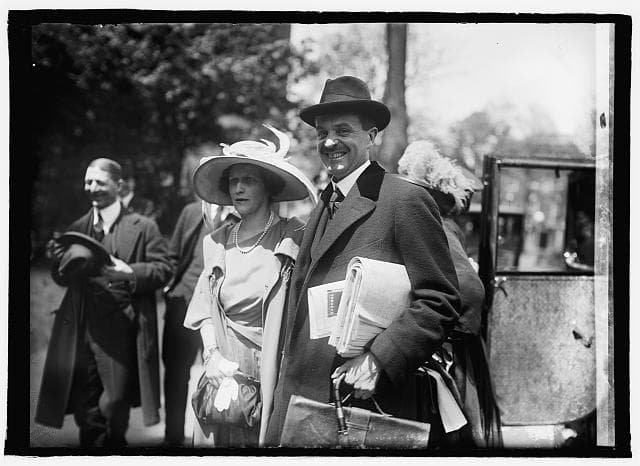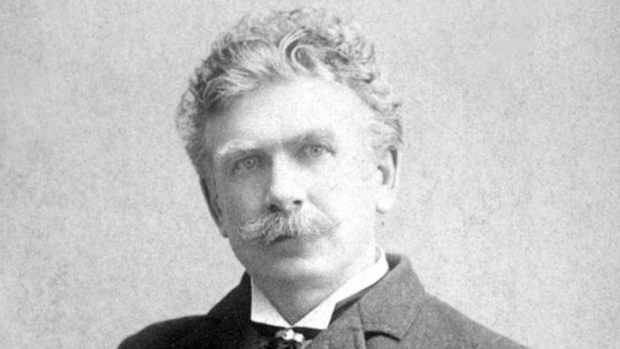The Cliveden Set Sought Appeasement With Hitler
The Beginning
Waldorf and Nancy Astor were highly prominent in British politics in the 1930s. They were of the view that Adolph Hitler was a man who could be reasoned with—play nice with him and he would play nice back.
Cliveden House
The Astors—he was the 2nd Viscount Astor, she was Lady Astor–lived in Cliveden House, a huge Italianate mansion on the River Thames about 25 miles west of London. The house and estate have a storied and occasionally sordid history (See Bonus Factoids).
The 2nd Duke of Buckingham began construction in the late 17th century as a place where he and his mistress, Anna Maria, Countess of Shrewsbury, could frolic to their hearts' content.
The duke died before it was finished and it burned down twice, was rebuilt, and came into the possession of William Waldorf Astor in 1893, who was America's richest man at the time.
William gave the house to his son Waldorf as a wedding present when he married Nancy Witcher Langhorne, the daughter of the American railroad baron Chiswell Langhorne.
The couple was also gifted the Sancy diamond, a 55-carat gem worth more than $1 million. In addition, the Astors had a grand home in one of London's most fashionable districts.
It was to these locations that the couple invited Britain's elites to discuss how to influence government policymaking.
The Political Leanings of the Astors
Waldorf Astor had been elected to Parliament in 1910. When he inherited his father's peerage he moved to the House of Lords and Nancy won election to his old seat. She was the second woman elected to Britain's House of Commons. Given their highly privileged backgrounds it's no surprise the Astors supported the right-wing Conservative Party.
The couple also carried some dark political baggage with them in the form of anti-Semitism. Nancy was in frequent correspondence with the U.S. Ambassador to Britain, Joseph Kennedy, another well-known anti-Semite.
The History News Network reports that “Astor wrote Kennedy that Hitler would have to do more than just 'give a rough time' to 'the killers of Christ' before she'd be in favor of launching 'Armageddon to save them. The wheel of history swings round as the Lord would have it. Who are we to stand in the way of the future?'
Kennedy replied that he expected the 'Jew media' in the United States to become a problem, that 'Jewish pundits in New York and Los Angeles' were already making noises contrived to 'set a match to the fuse of the world.' ”
It appears that Waldorf Astor, although sympathetic, was less venomous in these matters than his wife.
The Astors also exhibited a virulent hatred of Communism, along with prejudice against Roman Catholics, homosexuals, and most other minorities. The couple gathered around themselves influential people who held similar views.
The Cliveden Set
The people who gathered at Cliveden formed a who's who of those close to the inner circles of power in the United Kingdom.
Their number included Edward Wood (1st Earl of Halifax and cabinet minister), Samuel Hoare (Secretary of State for Foreign Affairs), Edward Fitzroy (Speaker of the House of Commons), Philip Kerr (Lord Lothian, author and politician), Sir Nevile Henderson (Ambassador to Germany), Geoffrey Dawson (Editor of The Times newspaper), an assortment of viscounts, barons, earls, and political and business figures.
With their connections in the corridors of power, these people pushed the policy of appeasing Hitler. This was carried out quietly away from the glare of publicity.
They found their champion in Neville Chamberlain who became British Prime Minister in May of 1937. He was a strong supporter of appeasing Hitler, a policy “which had the support of a majority of the Conservative Party and of parliament, large sections of the press, and (to the extent that this can be measured) a majority of public opinion” (Oxford Dictionary of National Biography).
Under the Treaty of Versailles that ended World War I, Germany was granted political control of the Rhineland, an area that borders Belgium, France, the Netherlands, and Luxembourg. The treaty also declared the region to be a demilitarized zone. In 1936, Hitler ordered his troops to occupy the Rhineland.
Lord Lothian responded by saying that Germany was simply occupying “their own back yard.” This summed up the Cliveden set's attitude towards German fascism, although Lothian was later to have a rude awakening about Hitler's true nature.
The Cliveden Set Exposed
In November 1937, an article appeared in a left-wing newsletter called The Week. The editor, Claud Cockburn, had long been opposed to giving in to Hitler's demands as he was convinced this would lead to war.
The article claimed that the Astors and their clique exercised undue influence on Britain's foreign policy, calling them “one of the most important supports of German influence here.”
In March 1938, Hitler's forces annexed Austria and the response from Britain's government has been generally regarded as feeble. Press coverage started to tie that policy to the influence of the Cliveden set just as Cockburn had alleged.
Then, in September 1938, Neville Chamberlain met with Hitler in Munich and was completely bamboozled into signing a peace accord.
All the führer wanted was to absorb the Sudetenland into Greater Germany he said. This was an area of Czechoslovakia in which mostly German-speaking people lived and that had been taken away from Germany by the Treaty of Versailles. Chamberlain agreed to this in exchange for a promise from Hitler that there would be no more marching into sovereign states.
The Cliveden set was ecstatic, Waldorf Astor wrote that “My own impression is that Europe, including the Nazis, have now turned their back on world war, if only because a general war means letting Russia loose in Europe, and trust a final settlement, including disarmament, may be possible if Neville's lead is followed up.”
In the video below, the sound starts 33 seconds in.
The Invasion of Czechoslovakia
In March 1939, Hitler unleashed his blitzkrieg on the rest of Czechoslovakia making the forces of appeasement look naively foolish.
Lord Lothian was shocked into an admission “that Hitler is in effect a fanatical gangster who will stop at nothing to beat down all possibility of resistance anywhere to his will.” It was time, he said, for a “grand alliance” to stop any further aggression.
It was the death knell for the Cliveden set, and public opinion turned against its members and its alleged secret machinations.
Nancy Astor was unrepentant, claiming criticism of her was the result of “Jewish Communist propaganda.” But, her reputation was in tatters. She and the rest of the Cliveden set were never able to wipe the stain on their honour that came with the allegation that they had been pro-Hitler.
It's still a matter of debate about whether the Cliveden set were willfully blind to Hitler's monstrous excesses or were more actively attracted by them.
Bonus Factoids
- In 1961, Bill Astor, who had inherited Cliveden House from his mother, Nancy, was showing guests his newly installed swimming pool. They found a lissome young woman skinny dipping. One of the guests was smitten by the sight of the lovely lady. who was a Soho showgirl named Christine Keeler. The goggle-eyed man was the Minister of War, John Profumo, and an affair with Keeler soon followed. But Keeler was also involved with a Soviet spy, so national security issues were involved, causing huge embarrassment to the Conservative government of Harold Macmillan and was a factor in its fall from power.
- In an earlier scandal, the original builder of Cliveden House, the Duke of Buckingham, was challenged to a duel by the Earl of Shrewsbury, whose wife was the object of Buckingham's lusty attentions. Buckingham's sword pierced Shrewsbury's chest, a wound that caused his death some weeks later. But, Buckingham's behaviour upset King Charles II frightfully and he ordered the duke to end his affair.
- Winston Churchill and Nancy Astor loathed one another and several acerbic remarks are said to have been exchanged between them. One such that is often repeated has Lady Astor saying to Churchill “Oh, if you were my husband, I'd put poison in your tea.” To which Churchill is alleged to have responded, “Madame, if I were your husband, I'd drink it with pleasure.”
- Cliveden House is now a luxury hotel. If you have to ask how much a room goes for, you probably can't afford it. However, it's more than $1,000 a night, although parking is free.
- In November 2019, then-British Prime Minister Theresa May said she was “delighted” to unveil a statue of Nancy Astor. It has since been vandalized with the word “Nazi” spray-painted on its base.





